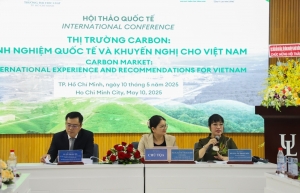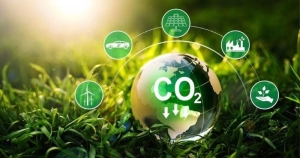INTERNATIONAL INVESTMENT
AND PORTAL
At the 2025 Vietnam Net-Zero Forum in Hanoi on July 18, stakeholders gathered to discuss the development of Vietnam’s carbon market – seen by many as an emerging yet promising sector in the country’s transition to a low-carbon economy.
 Photo: Hoang Anh
Photo: Hoang Anh
The forum, co-organised by the Consultancy on Development Institute (CODE) and The LEADER, drew in nearly 200 participants, including government officials, experts, leading emission-reduction enterprises, and journalists from major news agencies.
In his opening remarks, economist Le Xuan Nghia, director of CODE, noted that climate change is becoming increasingly complex on a global scale and remains the greatest challenge facing humanity, underlining the need for close international cooperation to address this issue effectively.
In his words, carbon neutrality and achieving net-zero emissions in the forthcoming decades are now central goals shared by nations around the world in the fight against climate change.
Vietnam, among the countries most vulnerable to climate change, made a strong commitment at COP26 to achieve net-zero emissions by 2050.
The country has pledged wide-ranging measures to reduce emissions across key sectors including industry, agriculture, transportation, and energy, while prioritising the development of renewable energy sources such as wind and solar power and improving energy efficiency.
Nghia stated that the net-zero commitment is vital, not only to minimise climate-related damages and promote a green transition, but also to enhance international cooperation and attract investment for sustainable development.
“Vietnam’s path to net-zero is not a long one. The next 25 years will be a challenging journey requiring us to pursue dual goals-cutting emissions while striving for high economic growth to become a high-income, developed country. This mission will require a unified effort from all sectors of society,” he stated.
According to Nguyen Dinh Tho, deputy director of the Institute of Strategy and Policy on Agriculture and Environment under the Ministry of Agriculture and Environment, Vietnam has taken initial steps toward building a carbon market as an economic tool aligned with sustainable development and climate adaptation goals.
The development of a legal framework for the carbon market is unfolding amid significant changes in international emission reduction cooperation mechanisms, particularly following the adoption of the Paris Agreement.
Domestically, the country’s net-zero commitment and updated Nationally Determined Contributions necessitate major policy shifts, including the integration of market-based regulatory instruments.
“The potential for Vietnam’s carbon market is significant,” Tho noted. “Thanks to our extensive forest coverage, readiness to implement the Reducing Emissions from Deforestation and Forest Degradation initiatives, growing renewable energy sector, and emission reduction capacity in agriculture and waste management, Vietnam is well-positioned to generate a large volume of high-quality carbon credits. Furthermore, waste-to-energy technology-common in developed countries-can reduce waste volume by 90-95 per cent, thereby significantly cutting methane emissions.”
Meanwhile, Le Quang Linh, an expert in emissions reduction and green finance at Giant Barb Company, highlighted the livestock sector as a major contributor to emissions, generating 61 million tonnes of manure, 304 million cubic metres of wastewater, and 15 million tonnes of carbon emissions annually.
Linh noted that untreated pig waste emits methane, a greenhouse gas 25 times more potent than carbon dioxide. However, capturing methane through biogas systems not only reduces emissions substantially, but also produces affordable clean energy.
“Vietnam’s Biogas Programme for the livestock sector has already issued approximately 928,000 carbon credits annually, with revenues covering around 50 per cent of the scheme’s budget,” said Linh.
 Photo: Hoang Anh
Photo: Hoang Anh
The forum also featured a series of practical case studies and presentations by scientists, experts, and businesses.
These included a low-emission, high-efficiency rice-shrimp farming model in the Ca Mau peninsula presented by engineer Ho Quang Cua, a Labour Hero recipient; carbon neutrality initiatives from high-tech agriculture conglomerate TH Group; and forest protection and carbon market participation opportunities for local communities in Cao Quang commune, Quang Tri province, presented by Nguyen Quang Huy, Vice Chairman of Cao Quang People’s Committee.
As part of the forum, the organisers awarded the ‘Outstanding Net-Zero Journey’ emblem to projects, initiatives, individuals, businesses, and organisations that have made significant contributions to emissions reduction and carbon neutrality, or that have had meaningful impacts on the community’s decarbonisation journey.
This recognition will become an annual parallel activity to the Vietnam Net-Zero Forum.
The Vietnam Net-Zero Forum is an annual initiative by CODE in collaboration with The LEADER, aimed at contributing to the implementation of the Vietnamese government’s international commitment to net-zero emissions by 2050.
Besides the main conference, held annually in early June to coincide with World Environment Day (June 5), the forum also conducted studies, surveys, and evaluations of community projects focused on emissions reduction, environmental protection, green growth, and the circular economy, all with the goal of achieving sustainable development.
 Carbon credit market can make all the difference
Carbon credit market can make all the difference
In Vietnam, the carbon market will be developed and operated under strict government supervision, emphasising the principles of transparency, publicity, efficiency, national suitability, and alignment with international practices.
 Legal and digital leverage paves the way for sustainable carbon market
Legal and digital leverage paves the way for sustainable carbon market
An international conference in Ho Chi Minh City on May 10 explored legal and digital solutions to build a sustainable carbon market and support Vietnam's net-zero emissions target by 2050.
 Ministry of Finance issues plan to develop carbon market
Ministry of Finance issues plan to develop carbon market
The Ministry of Finance issued a plan in late May to implement the tasks assigned by the prime minister to establish and develop a carbon market in Vietnam.



















